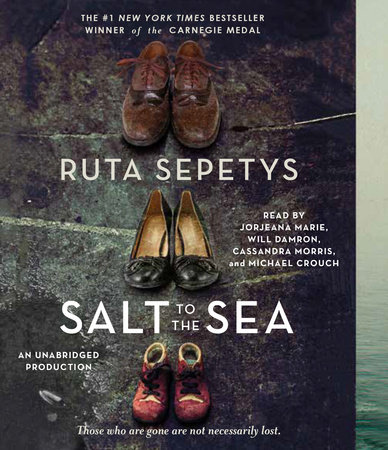I have been waiting for this book for it to be finally released, it took me even longer to finally have it in my hands and be able to read it. Eventually, it took me only one evening to not only finish another bestselling book by Ruta Sepetys, but also to spread my ideas and thoughts here, in this blog. For those of you do not know, Ruta Sepetys is Lithuanian author living in the United States. Her first book "Between shades of grey" was a great success and I cannot wait until October, 2018, because after a long wait the movie adaptation for this book will hit the screens.I admit it, "Salt to the sea" was one of the greatest books I have read in 2017 and it was the reason why I returned to this blog - to my secret, but still often visited place by you, my dear readers.
 Just as everyone's beloved "Between shades of grey" story, "Salt to the sea" takes its reader back to the period of World Wars. This time Lithuanian author chose to write about a "Wilhelm Gustloff" ship and its story which not many people across the world are aware of, including four characters, representing different countries, trying to catch the ship in order to escape from the death. I love history, I love historical books and movies, but even I have not heard about this ship, so it was an exciting reading about the tragic in Baltic sea.
Just as everyone's beloved "Between shades of grey" story, "Salt to the sea" takes its reader back to the period of World Wars. This time Lithuanian author chose to write about a "Wilhelm Gustloff" ship and its story which not many people across the world are aware of, including four characters, representing different countries, trying to catch the ship in order to escape from the death. I love history, I love historical books and movies, but even I have not heard about this ship, so it was an exciting reading about the tragic in Baltic sea.
Ruta Sepetys chose to write about the year of 1945 - the year when the second World War was coming to its end. During this period Lithuanian Joana, Polish Emily, and Prussian (the country which at that time still existed) Florian met each other under unexpected circumstances while trying to catch the ship in the middle of their journeys. There were more significant characters in this book, but the story was told from their perspectives only - each refugee had had their own chapters in order for us, readers, to get to know them from the inside. The fourth storyteller, not mentioned among the three of them, was German Alfred had a more technical role for this book - he represented the other side of the story - the bad ones. Alfred was a special character , he was much different than other characters, but I will tell you more about him in a bit.
We are not introduced to the lives of the characters before they had to leave their homes - author decided to keep one direction, but even so, every line about the homesickness of the characters helped to imagine them more easily in the surroundings which were not destroyed by the war - in this way readers are able to get to know the characters as they actually were. I will admit it, I have not been living in Lithuania for the past few months, I did not have a lot of time to even have a glance at the books, but I experienced the greatest adventure of my life. Being away from my home country made me notice myself paying more attention to Lithuanian aspects in this book: how back in those days one character admired the storks and how excited she was to see them coming back to the nature after a long and dreary winter. In 1945, not taking a war into consideration, people felt happiness for things which now may not even seem important or relevant, they knew how to "stop the charming moment" as one Lithuanian author once meant by being able to enjoy the current moment. Now we see those moments pass and we focus more on the "better future" without actually knowing what it means or if there will be one. What I mean by this, is that while I was reading this book, there were many occasions when I questioned my own values of my life, the fragility of life and love for my home country. I hope that you too will be able to feel the same way I did, that you will find something that you feel close to.
While evaluating the writing style of this author, I can easily recognise her unique style and choice of words which made us all fall in love with her first books. Her writing style makes us embody the characters and to understand what they felt. After finishing "Salt to the sea" I spent some time reading foreign reviews about this book and what I noticed was the fact that not everyone enjoyed the short paragraphs and short chapters. Personally I was not irritated by them, having read 3 of Ruta Sepetys books so far I see her eager to experiment with writing techniques and I actually admire author for challenging herself. She was able to test something new, but at the same to to stick to her own guts and this is one of the reasons why most of her books become worldwide bestsellers. Some fragments of this book felt like short hints about further events and what else could be expected. Before I started this story, I had not read the book annotations for a long time in order to feel even more exciting, but eventually I remembered the main object - the tragic events of the ship. Even though 40% of the story-line is related to narrative about characters trying to catch the ship and every reader believes that the escape is the most important part of the book, suddenly things turn around completely and you find yourself feeling completely lost, but even more captured.

Referring back to the characters, I believe many readers got the impressions, based on which, you are suppose to feel sorry for 4 of the characters and their friends of the journey. Their lives were portrayed in a deeper manner, readers were introduced to some details from their past lives, but even the fact that the story is developed in the surroundings or the war where you see a lot of people dying among our heroes, you cannot feel the same level of sadness for them as you would for the main ones. Why? I keep asking myself this, but I believe that this again is related to the writing style of the author. This could be considered as a negative aspect of the book, but again, the fact that the author herself did not experience these events makes it easier to understand it. The book is based on true events which were told by people who survived the tragic and every story is put into only one thin book...
I will not describe each character in detail, I believe you would all like to meet them and make your first impressions about them yourselves, but I will break this statement by telling you more about Alfred. He was one of those characters which do not fit in among others. He introduced the other side of this story - from the perspective of the enemy, as he represented the soldier who was waiting for the refugees in the port. Do not think that Alfred was a bad guy in all terms, author created him as a naive and brain washed soldier. Alfred was a true follower of the fuhrer whom he believed in. But what he wanted the most was to return back to the love of his life to whom he wrote letters to, telling fake stories about his fake achievements.
Well-aimed and a little bit ironical remarks of the author made me look at this book differently, as if it was much livelier and full of energy, spirit. Yes, war topic is undoubtedly heavy and for our generation not imaginable, but sometimes even during the hardest moments in life it is important to find some light - in this case, some sense of humour which made this story even more special. We are all optimists, some of us more than the others, but still, so why don't we look at the world through pink glasses? Maybe many of you would question this point of mine, but I feel more captivated by this book because of those short phrases that directed my mind further from the tragic story-line.
As I have already mentioned, I finished this book during one evening with only a few breaks. Before the second break I had already reached the chapter which was the most expected probably by all the readers in the world. It seemed as if there was a change of a happy ending for everyone, but suddenly it was not. Many people agree on the fact that this story is like European Titanic story, but I would like to remind the readers, especially every single Lithuanian, to focus not on the love story and romantic side of the book, but on the tragic based on true events. Titanic included rich people who had a desire to travel, to see the world. And yes, there were many of those we were not that fortunate, but at least they were still free and independent, when Wilhelm Gustloff passengers were not - they were running from the death.
For the concluding point of this book I would like to mention some of the genius decisions made by Ruta Sepetys. Her writing style keeps fascinating me and helps me to understand, that even though every minute a new book is released in the world and due to the digital platforms almost everyone can call themselves writers, it is still possible to find those captivating hooks and the ability to play with the language, to manipulate. What I mean is the name of this book and its explanation in the book. I believe that from now on, having read this, I will not be the only one looking at the Baltic see or any other see differently. Keep in mind this metaphor, try to find it hidden in the book and cherish it, because it is our history, our tragic which should be known for everyone. Another recommendation for the readers would be to try finding a connecting point between both books "Salt to the sea" and "Between shades of grey" - I am pretty sure you will not be disappointed!
I really wanted to read this book since the moment I found out about it - and I am more happy now, when I actually did it. I hope that all of my loyal readers do read all of the books by Ruta Sepetys - they are my absolute favorites. I do not feel very pleasantly after reviewing this story very positively because of the tragedy which took millions of lives, but I want to emphasise the title of the book "Salt to the sea" which summarises the whole story and helps us to honour the lives taken away.

